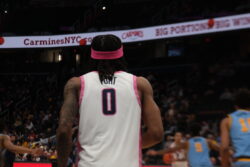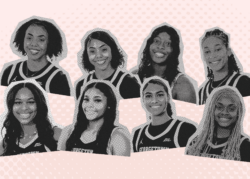I’m exhausted.
On Tuesday, ESPN launched the 2009-2010 college basketball season with the appropriately-titled College Hoops Tip-Off Marathon. The World Wide Leader in Sports promised non-stop basketball from midnight to midnight, and I foolishly decided I would watch it all.
For some reason I thought this hoops immersion would give me some deep insight into the college game. In the end, I guess it did—I learned November basketball is the anti-March Madness.
I must confess I didn’t watch every minute of game action. I was at the Verizon Center for a significant portion of the afternoon for the Georgetown game, and I had to attend a class. Also, I decided to sleep through the 6 a.m. game. In my defense, St. Peter’s beat Monmouth 58-34 in that game—if I had tried to watch I would have fallen asleep anyway.
By skipping that game, I thought I was avoiding the worst of the day. After all, the other eleven games on the slate offered five ranked teams and nine squads that made the NCAA tournament last season. I was wrong.
Things started off promisingly, with Cal State Fullerton taking on UCLA. It was not a pretty game—a recurring theme of the Marathon—but it was exciting to see a rebuilding UCLA squad struggle with a mid-major like Fullerton. When Fullerton finally prevailed in double overtime, it felt like I had just watched a first-round NCAA tournament upset.
That illusion was quickly shattered, because I’m never going to be watching San Diego State-St. Mary’s or Northern Colorado-Hawaii in March. I have no idea why ESPN couldn’t get better teams to play at four in the morning.
The beauty and curse of college basketball is that the postseason decides everything. Unlike in Division I college football—which sacrifices legitimate competitive resolution to imbue every game with extra importance—regular season basketball is meaningful only as it relates to March. Sixty-five teams will be given a chance to be crowned the undisputed national champion; the goal of the regular season is to get into that field.
With around 30 games in the season, no one contest makes or breaks a team’s postseason chances. That’s especially true in the middle of November. Whatever the results of Tuesday’s games, they will be mostly irrelevant in five months.
But while the final score may ultimately not matter, early season basketball still has value. Two teams playing for 40 minutes—that has to reveal something. Teams don’t just appear in March, they follow a long road that begins now.
And of course, basketball at its core is supposed to be entertaining—that’s why people watch it and care about it. Entertainment value is a function of quality though, and the one thing that I learned from watching the Marathon is that no team is really good in November. The first few games are the time when teams work out the kinks and learn to work together—an essential process without a doubt, but one that makes for a particularly painful spectator experience.
Sad as it is to say, no game better epitomized the masochism of my viewing marathon than Georgetown-Temple. The Hoyas couldn’t shoot (15-for-42 FG), couldn’t pass (seven total assists), and couldn’t hold on to the ball (16 turnovers)—and they won the game! Georgetown scored 46 points and that was good enough for the victory. In the next game Charlotte scored 59 points, and they still lost to Duke by 42. John Thompson III himself called the game “ugly.”
If not for Greg Monroe’s last second heroics, Georgetown would have lost that game. A defeat definitely would have felt a lot different to the Hoyas and their fans, but in reality there would have been no difference. Whether that game goes down as a win or a loss, Georgetown still has to make the same improvements.
Georgetown wasn’t the only top team that struggled. ESPN closed out its Marathon with marquee games featuring the nation’s two top-ranked teams. No.1 Kansas and No. 2 Michigan State both almost fell to unranked Memphis and Gonzaga, respectively. The supposed best teams in the country aren’t even dominant in November.
When Memphis bricked a three, allowing Kansas to survive, my long day was finally done. Twenty-four hours of empty, if occasionally exhilarating, basketball had tired me out. Wake me up in March.






